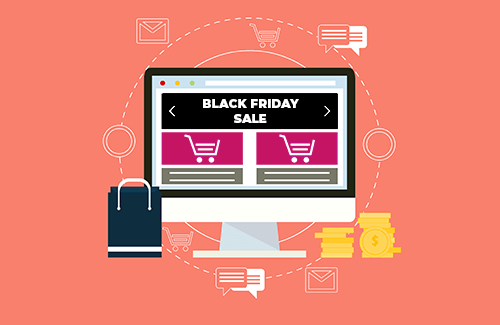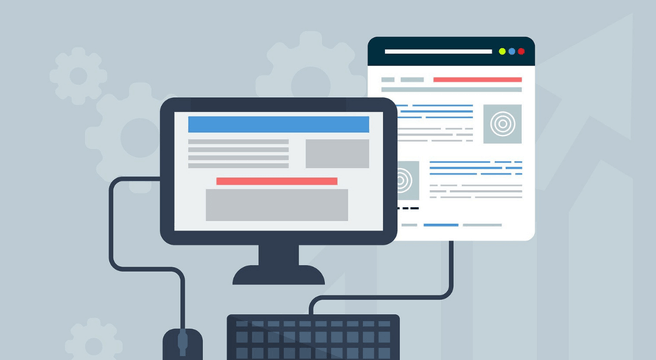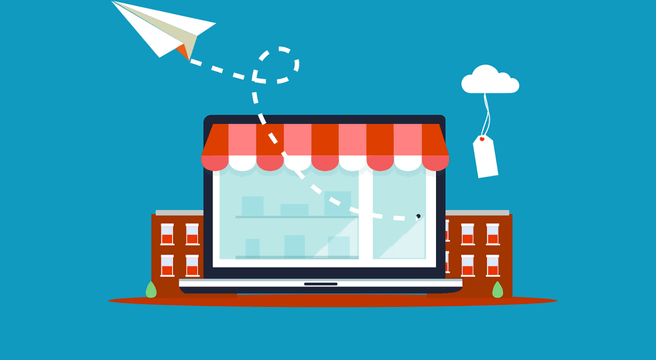With Covid-19 continuing to sweep through the country, and the focus shifting once again towards lockdown, it would be easy to miss the opportunities presented to most businesses at this time.
Covid-19 has changed so many aspects of our lives. The enforced lockdown in early 2020 changed many people’s buying habits. No longer could we stroll through the street or enter a shopping arcade. If we wanted to buy things, we had to buy online.
Covid-19 has possibly accelerated our buying habits by five years, removing the fear of buying online. As a result, high street shopping has taken a huge dip, accelerated by people’s fear of shopping and mixing with others plus the lengths retailers have to go to keep shoppers safe; such as queuing systems, controlling our movement within the shop and the inability to touch goods. Our entire shopping experience has changed, virtually overnight.
Our search for a good online shopping experience has so far taken us to the more established and well-known online retailers. These are the stores that first introduced us to the phrase “Black Friday.” This has hailed from America and it would seem that we’re accepting more American events now. At one time we didn’t celebrate Halloween, but this is now a much bigger event and again one where retailers enjoy another rise in sales.
Black Friday is a huge American event, falling the day after Thanksgiving. It’s now known as THE biggest shopping day of the year and the commencement of Christmas shopping. Black Friday kicks off the biggest shopping weekend of the year.
Over the last nine years, Black Friday has grown in popularity in the UK, culminating in stampedes in some retailers in 2014, worse than Boxing Day sales. There was a shift last year to curb this, especially in some of the larger retailers because of the dangers to the customers and due to some of the most shocking behaviour in store. However, with the local lockdown restrictions, and a greater percentage of shoppers favouring online shopping, Black Friday could become an even greater shopping bonanza for the established online retail stores.
If you are in business and supply products that can be purchased and shipped, this is the ideal time to invest and bring your business into the 21st century. There’s never been a better time to update your online presence and transform your business. To survive and grow, a business must be selling online, diversifying and re-structuring to ensure a seamless, fast, enjoyable experience for today’s shoppers.
Selling online has its pitfalls. When the internet was first introduced, many thought all they had to do was build a website and the world would shop and make them rich. We now know this wasn’t the case and the .com boom didn’t last. What followed was a more practical, business sensible market which has steadily grown.
The competition has also grown so you are now faced with competition across the country from businesses of all sizes, plus oversees business. It’s important that you have both the front end (website and payment systems) plus back end (delivery and follow up) systems in place and robust before you launch.
If your business is about to embark on a Black Friday 2020 campaign, or run them annually, then here are a few strategies to ensure your event is successful:
1. When should you start to advertise your Black Friday deals?
Irrespective of your business’ reputation, you must advertise early and ensure your existing customers are aware of this. It’s an ideal opportunity to create a very special “friends and family” offer with a discount code. This allows you to reap the benefit of customer loyalty plus the massive potential from social marketing. You’re already aware how much a good recommendation plays in a purchase, it’s virtually guaranteed.
You are competing with so many huge names who are also targeting your customers, so it is essential to crank up your marketing engine, ensuring it is pumping out emails every day and social media posts multiple times daily. It’s also important to recognize the different social media channels and how to use each of them to best promote your marketing messages.
2. Check and double check your website capabilities
If your Black Friday sale takes place online, check that the hosting package you have with your service provider will be able to cater for an increase in the level of traffic to your site. The last thing you need is for your website to crash because your host cannot cope with the volume of traffic and transactions.
Over the last few years, the development or smart phones and 4-5G has significantly increased online surfing and purchases via this medium. This is a good time to check that your website is robust and can withstand demand from both desktop and mobile devices.
- How mobile friendly / mobile responsive is your website?
- Is your checkout process via a mobile device easy to navigate?
According to a 2019 Black Friday study by Barilliance, in the UK, 71.3% of all online shopping carts were abandoned before the purchase transaction was completed, with the highest rates recorded on mobile.
So why do people abandon an online shopping cart? Here are few of the top reasons – could any of them be affecting your online sales?
- Expensive shipping charges
- Couldn’t find preferred payment option
- Concerns over transaction security
- No ‘guest’ checkout option
- Payment process is not mobile-friendly
- Lack of customer support
The outcome can be that a significant amount of revenue is lost. The lesson here is to ensure that your shopping cart can handle such volume of traffic and you continue to engage with the prospect throughout the entire shopping process, holding their hand until the payment has been made and your auto-responder has acknowledged the sale.
3. Suppliers
Whilst this may sound obvious, many stores work on a just-in-time policy with their suppliers. It’s always prudent to check and potentially lock down availability from your supplier chain to ensure they can meet potential demand and completed purchases from your website.
With lockdown, and possible shortage of staff through self-isolating or other reasons, it’s important you address any potential issues with your suppliers early.
Shoppers are more impatient these days. Your ability to deliver on time is essential at times like this.
4. Follow up
In strategy number 2, I closed the section by mentioning the number of failed shopping cart transactions. If this event was to occur this year, why not establish a backstop system? For any shopping cart transaction that failed, you need an automated email to the proposed buyer setting up a second chance to complete the transaction by following a link.
Make this buying system simple for the shopper. If you add multiple steps they will walk, so the message is to keep your system simple and as automated as possible.
For all completed purchases, this is your big chance to grow your customer base. Rather than welcome a one-time buyer, it’s much better to open the door to a frequent buyer that can be seen as a long-term friend. Your marketing engine must be primed to ensure you retain their loyalty by visiting your online store time and again. Perhaps offer an upgrade or alternate products with discounts, where you can add to the existing delivery at no additional or very small cost?
Alternatively, as your back-end marketing takes over the sale and advises the customer when their goods will be delivered, this is an ideal opportunity to re-sell other products that are popular or are a good match with the product(s) they have already purchased.
Offline sales are important too…
While this article has so far been geared to online sales, it’s important to recognise that offline or in-store purchases take place too.
5. Keep control
Having seen the disorderly behaviour of some shoppers, it’s important to recognize what panic-buying does to some people. When you add to this equation the effects that lockdown may have on shoppers and what driving desire can do, it’s important to re-think the layout of your store/business to protect shoppers and your staff.
Controlling entry and exit points is vital.
If you expect to see a surge of shoppers in your store then another very important aspect will be assigning sufficient staff to the tills to help your customers pay and leave quickly.
6. Speedy processing is essential
The key to a successful Black Friday weekend, is to ensure that buyers get what they want at the right time. Speed of purchases in your store allows the traffic to flow quickly.
People will queue outside, because they are now used to it, but there is a breaking point. Can you have someone talking to them outside? This engagement can make a massive difference as it’s the beginning of their shopping experience. Let them know how you need them to move within the store and what you’re doing to make their shopping experience an easy one.
People may panic in queues if they are worried they won’t get what they want.
You could have staff taking orders electronically outside so that goods are ready for them when they enter the store. This takes the panic pressure off the shopper who is queuing.
Anything you do where you are thinking about your potential customer outside is going to be remembered. Is it possible for you to joint venture with a drinks provider so that your potential customers stay refreshed whilst waiting? Whilst it may seem a strange thing to do, it may just work. It will certainly add another dimension to the shopping experience. The drinks don’t have to be free. A portable coffee stall could be very welcome and keep shoppers warm whilst queuing.
7. Staff training
In a normal year, at this time of year, stores expect to be busier and therefore gear up by taking on additional temporary staff. However, with Covid-19, the recruitment process may be slower. If you do recruit, it’s imperative that you supply the best training and keep their tasks relatively low, especially whilst they are getting up to speed. The last thing you need is a newbie handling a till and making a complete mess because they panic due to the sheer pressure at the tills. Ideally, you should double up on tills or have senior staff with the equipment to be a portable till and payment taking operative if need be.
Your entire focus should be on ensuring your customer’s experience with your business is a good one, whilst protecting your staff. Every little thing you do to make this happen will go a long way to ensuring the customer will return. Whilst it’s great if they return for another Black Friday, your role is to ensure that they return time again. To do this, the store must capture customer details quickly, especially their email address, so that you can sell to them again. Perhaps, capturing this at the till, with the excuse of registering warranty will help. This way, you know exactly what they purchased, which in turn opens up the option to sell increased warranty, similar or essential extras in the back-end sale.
Most business owners recognise that the back-end sale can be significantly more profitable than the first sale. So, perhaps there may need to be an added incentive to capture the customer’s email address at the source. Amazon is excellent at recommending associated products when you have shown interest in just one product. McDonalds use an upsell policy by trying to add other products to your order or to get you to ‘go large’.
In Summary
With Black Friday not too far away, it’s time to get planning and busy. My advice is to do what you can to give your existing and new customers a great experience. Focus on the making the sale happen as easily as you can, and make sure you have back up plans in the event technology cannot cope with the volume of transactions.
But be warned, get it wrong and a Black Friday sale could turn into a publicity nightmare. In 2010, Amazon was accused of putting up ‘fake’ deals and shoppers claimed the deals disappeared so quickly they were impossible to take up.
On Black Friday in 2014, Tesco experienced issues across a number of stores including:
- around 200 shoppers refusing to leave, despite being told that the discounted stock had all gone.
- fights between shoppers.
- a woman suffered minor injuries after being hit by a falling television.
- a man was arrested after threatening to hit a member of staff.
So if you don’t think your business has the ability to handle it, don’t do it!
This article was originally published on 21 November 2016, and updated on 31 October 2020.






